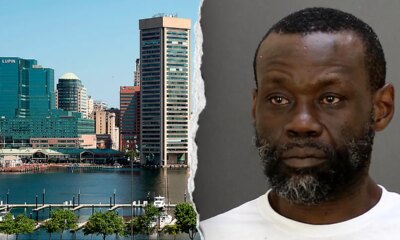Maryland
Maryland bishops call assisted suicide legislation ‘deadly proposal’ putting vulnerable people at risk

As Maryland lawmakers again consider legalizing physician assisted suicide, the state’s Catholic bishops issued a statement Jan. 30 calling on Marylanders to reject this “deadly proposal” that puts “our most vulnerable brothers and sisters at risk of making decisions for themselves that are manipulated by factors such as disability, mental instability, poverty and isolation.”
“We urge all people of good will to demand that our lawmakers reject suicide as an end-of-life option and to choose the better, safer path that involves radical solidarity with those facing the end of their earthly journey,” the bishops wrote in their statement. “Let us choose the path that models true compassion and dignity to those facing end of life decisions and protects the most vulnerable from the deadly proposition of physician assisted suicide.”
Titled “A Better Way Forward,” the statement was signed by Washington Cardinal Wilton Gregory, Baltimore Archbishop William Lori, and Wilmington Bishop William Koenig. Those three dioceses encompass the state of Maryland.
“In 2024, medical advancements and improvements in pain management mean we can make individuals with terminal illnesses comfortable and improve the quality of the remainder of their lives without them feeling the need to reluctantly choose a ‘dignified death’,” the bishops said. “It is incumbent upon each of us to ensure that those at the end of their lives can experience a death that doesn’t include offering a form of suicide prescribed by a doctor.”
The statement was issued as state lawmakers will deliberate allowing licensed physicians to legally prescribe medication at the request of a patient who has been deemed to have “the capacity to make medical decisions,” and “who has a terminal illness with a prognosis that likely will result in the individual’s death within six months.”
“It is deeply illogical for the State of Maryland to be seeking ways to facilitate suicide for those with a terminal illness, all the while claiming such preventable and unnecessary deaths are somehow dignified,” the bishops said.
Called the “End-of-Life Option Act (The Honorable Elijah E. Cummings and the Honorable Shane E. Pendergrass Act),” the bills are SB0443 with Sen. Jeff Waldstreicher (District 18 – lower Montgomery County) as the primary sponsor in the Senate, and HB0403 with Del. Terri Hill (District 12A – Howard County) as the primary sponsor in the House.
The Senate version of the bill is scheduled for a Feb. 8 public hearing before the Judicial Proceedings Committee. A joint committee hearing before the House Government Operations Committee and the House Judiciary Committee is slated for Feb. 16.
Last year, similar bills received public hearings, but did not advance out of their respective committees.
Jenny Kraska, the executive director of the Maryland Catholic Conference (MCC), noted that the measure is “the same bill that’s been introduced in past years.” Frequently called “medical aid in dying” or “death with dignity,” similar bills have been introduced in Maryland in 2015, 2017, 2019, 2020 and 2023.
The MCC is the public policy arm of the state’s bishops, including The Roman Catholic Archdiocese of Washington, D.C. which includes five Maryland counties, the Archdiocese of Baltimore and the Diocese of Wilmington, Delaware, which includes the Eastern Shore.
It has joined with Maryland Against Physician Assisted Suicide (MAPAS), a nonpartisan coalition of health care professionals, disability rights advocates, mental health professionals, advocates for seniors, and members of faith communities that was organized in opposition to the push to legalize physician-assisted suicide in Maryland.
“In every state or country where this dangerous policy has been legalized grave abuses and expansion have occurred, making assisted suicide available to far more people and not just those facing imminent death,” the Maryland bishops said in their statement.
Only 10 states – California, Montana, Maine, Vermont, Colorado, New Jersey, Washington, New Mexico, Hawaii and Oregon – and the District of Columbia have legalized physician assisted suicide.
With physician-assisted suicide, a doctor prescribes a lethal drug cocktail of up to 100 pills that a person picks up at the local pharmacy, grinds up and mixes into soft food.
“There’s been instances that I’ve heard anecdotal about people who have had reactions to the medication,” Kraska said. “And it burns the inside of their mouth, so they’re not able to consume all of the food. And that causes problems, people regurgitate some of it. There’s a lot of issues with this, as there should be.”
She noted that proponents of physician-assisted suicide “package this as a very nice – you say goodbye to everyone you know, you get your last hugs and well wishes and you just sort of fall asleep and don’t wake up.”
“That’s probably the furthest from the truth of what actually happens,” she stressed. “It takes anywhere from hours to days to pass away, and during that time it can be painful. It can be excruciating. People you know – your loved ones– are having to watch you have a hard time catching your breath or breathing… This isn’t just a peaceful take some pills and you slowly pass away and go to sleep.”
The Maryland bishops, in their statement quote Pope Francis who said, “We must accompany people towards death, but not provoke death or facilitate assisted suicide… life is a right, not death, which must be welcomed, not administered.”
The complete text of “A Better Way Forward,” the message on physician assisted suicide from the Catholic Bishops of Maryland, can be found at https://www.mdcatholic.org/wp-content/uploads/2024/01/Md-bishops-pas2024.pdf
The MCC has an online toolkit for those who seek to work against legalizing physician assisted suicide. Visit www.mdcatholic.org/pas. It also has an active action alert to write legislators. Log on to https://p2a.co/WK2gk7Q .
The Catholic Advocacy Network helps Maryland Catholics learn about the issues and provides an opportunity for constituents to be heard by their legislators. Parishioners can join the Catholic Advocacy Network at mdcatholic.org/joincan.

Maryland
Severn scratch-off makes player a millionaire as Maryland Lottery pays $31.8M in prizes

SEVERN, Md. (WBFF) — A scratch-off ticket sold in Severn turned one Maryland Lottery player into a millionaire, leading a week in which the Lottery paid out more than $31.8 million in prizes statewide.
Maryland Lottery and Gaming said it paid more than $31.8 million in prizes from Feb. 23 through March 1, including 36 tickets worth $10,000 or more.
The top scratch-off prize claimed during that period was a $1 million winning $1,000,000 Crossword ticket sold at the Walmart at 407 George Clauss Boulevard in Severn. Another top winner was a $100,000 Red 5’s Doubler ticket sold at the Carroll Motor Fuel station at 2535 Cleanleigh Drive in Parkville.
Other scratch-off prizes claimed Feb. 23 through March 1 included two $50,000 winners: a 200X the Cash ticket sold at the Wawa at 7501 Pulaski Highway in Rosedale, and a $5,000,000 Luxe ticket sold at the Spring Hill Lake Mini Market at 9240 Spring Hill Lane in Greenbelt. A $30,000 Diamond Bingo 6th Edition ticket was sold at Tempo Lounge at 402 Back River Neck Road in Essex.
ALSO READ | SUN | Maryland GOP unveils energy plan it says saves customers up to $40 a month
The Lottery also reported three $20,000 scratch-off winners, all on $1,000,000 Crossword tickets sold at Geresbeck’s Food Market at 8489 Fort Smallwood Road in Pasadena; Hillandale Beer and Wine at 10117 New Hampshire Avenue in Silver Spring; and Paddock Wine and Spirits at 7627 Woodbine Road in Woodbine.
The Lottery reminded players to sign the backs of tickets and keep winning tickets in a safe location.
The Lottery said the last dates to claim scratch-off tickets are posted on the scratch-offs page at mdlottery.com.
More information is available at mdlottery.com.
BE THE FIRST TO COMMENT
For confidential help or information about gambling problems, visit helpmygamblingproblem.org or call 1-800-GAMBLER.
Maryland
SUN: Dozens of vehicles moved to planned Maryland ICE facility; advocates concerned

Advocacy groups are raising concerns over a warehouse in Washington County that is slated to become an Immigration and Customs Enforcement processing facility after dozens of black SUVs were moved to the warehouse’s parking lot on Sunday.
“When federal enforcement vehicles begin lining the warehouse lot, it sends a clear message about what’s taking shape in our community,” said the organizer of Hagerstown Rapid Response, Claire Connor. “We refuse to let ICE quietly plant roots in Washington County without transparency, accountability and community consent.”
The 825,620-square-foot warehouse is located at 16220 Wright Road in Williamsport. Access to the facility was blocked by orange traffic barriers and signs outlining regulations and “governing conduct on federal property” with the Department of Homeland Security emblem at the top of the page.
In late January, Washington County issued a news release stating that on Jan. 14, the U.S. Department of Homeland Security sent a letter to the county’s historic district commission and department of planning and zoning regarding the property.
BE THE FIRST TO COMMENT
Read the full story on the Baltimore Sun’s website.
Maryland
Howard County police investigate fatal officer-involved shooting in Columbia

COLUMBIA, Md. (WBFF) — An adult man was killed in a police-involved shooting in Columbia early Sunday, prompting an investigation by the Maryland Attorney General’s Independent Investigations Division.
Howard County police said officers were called on March 1, at about 12:09 a.m., to an apartment building in the 6400 block of Freetown Road for a report that involved an adult male threatening to harm himself.
According to police, at about 12:22 a.m., officers encountered the man outside the building. The man approached officers while holding a knife and ignored commands to drop the weapon, police said. Officers then shot the man.
ALSO READ | Gas leak explosion, fire in Prince George’s County leaves 1 injured
Officers attempted life-saving measures, but the man was pronounced dead at the scene. Officersrecovered a knife near the man.
No officers were injured, and the officers were equipped with body-worn cameras.
The Independent Investigations Division is investigating.
Anyone with information about this incident, including cell phone or private surveillance video, is asked to contact the IID at (410) 576–7070 or by email atIID@oag.maryland.gov.
The IID willgenerally releasethe name of the decedent and any involved officers within two business days of the incident, although that period may be extended, if necessary,pursuant toIID protocol.
JOIN THE CONVERSATION (4)
TheIID willgenerally releasebody-worn camera footage within 20 business days of an incident. There may be situations where more than 20 days is necessary, including if investigators need more time to complete witness interviews, if there are technical delays caused by the need to shield the identities of civilian witnesses, or to allow family members to view the video before it is released to the public.
-

 World5 days ago
World5 days agoExclusive: DeepSeek withholds latest AI model from US chipmakers including Nvidia, sources say
-

 Massachusetts5 days ago
Massachusetts5 days agoMother and daughter injured in Taunton house explosion
-

 Denver, CO5 days ago
Denver, CO5 days ago10 acres charred, 5 injured in Thornton grass fire, evacuation orders lifted
-

 Louisiana1 week ago
Louisiana1 week agoWildfire near Gum Swamp Road in Livingston Parish now under control; more than 200 acres burned
-

 Technology1 week ago
Technology1 week agoYouTube TV billing scam emails are hitting inboxes
-

 Politics1 week ago
Politics1 week agoOpenAI didn’t contact police despite employees flagging mass shooter’s concerning chatbot interactions: REPORT
-

 Technology1 week ago
Technology1 week agoStellantis is in a crisis of its own making
-

 News1 week ago
News1 week agoWorld reacts as US top court limits Trump’s tariff powers

















